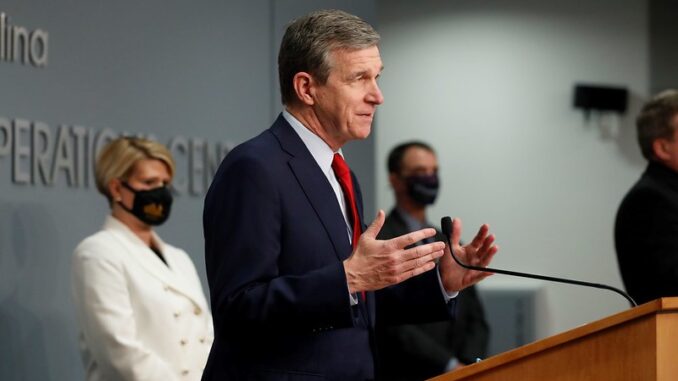
RALEIGH — Last October, the State Board of Education was presented with information about the North Carolina Education Corps, a proposed program that would train volunteers to serve as a sort of liaison between school districts and their students.
According to the N.C. Education Corps (NCEC) website, citing COVID-19 disruptions to education, the organization “will recruit, train and deploy talented community members to support our public school districts, their students, and families.”
Districts were invited to apply and list the types of needs and issue each was experiencing. Districts were broken down into three tiers, with tier one being the most economically distressed districts and three the least.
At least 20 districts had signed up by the end of December 2020, including Ashe County Schools, Camden County Schools, Clinton City Schools, Cumberland County Schools, Durham Public Schools, Elizabeth City-Pasquotank Public Schools, Halifax County Schools, Hickory City Schools, Jones County Public Schools, Lexington City Schools, Mount Airy City Schools, Newton-Conover City Schools, Perquimans County Schools, Person County Schools, Pitt County Schools, Stanly County Schools, Vance County Schools, Wake County Public Schools and Winston-Salem/Forsyth County Schools.
Examples of support tasks on the NCEC website include volunteers serving as tutors/mentors, helping students and their families navigate the digital learning environment, and mentoring high school students who have stopped logging in or are showing up only sporadically.
Additional tasks include assisting teachers and counselors to “serve as linchpins between students and the social, emotional, trauma-response resources that they need.” Another task may be to help district leaders “track COVID cases as a contact tracer.”
The October presentation to the state board was given by Dr. Mike Ward, a former North Carolina state superintendent (1996-2004). Ward had previously been superintendent of Granville County Public Schools as well as holding a teaching and a principal position in Lee and Wake Counties.
Joining Ward was John-Paul Smith, the program director for NCEC. Documents filed with the state list Smith as the CEO of American Ripples, a 501(c)3 established on Aug. 24, 2020. The address for the organization appears to be Smith’s residence. No other documents beyond American Ripple’s creation filing were found in the records kept by the N.C. Secretary of State.
Smith’s LinkedIn resume does not have a background in education, but instead a series of consultant positions. Prior to creating American Ripples, Smith was a Self-Help Credit Union intern and did a four-month stint as a non-descript “consultant” for Gov. Roy Cooper’s office.
Initial funding for the new organization is coming from taxpayers in the form of federal dollars.
“Individuals associated with American Ripples have contracts to perform certain tasks related to recruiting and training corps members by December 30,” Smith told North State Journal via email. “NC Education Corps is a partnership between the North Carolina State Board of Education, the Office of the Governor, local school systems and the N.C. Commission on Volunteerism and Community Service and the website will be updated to better reflect this.”
In November 2020, the governor’s office announced he would be releasing certain pandemic relief funds at his disposal to school districts who will then pay NCEC members.
“Compensation for Education Corps members will be provided by local school systems, which can utilize funding provided to them from North Carolina’s share of the Governor’s Emergency Education Relief (GEER) Fund, a part of the federal CARES Act,” read the statement from Cooper’s office.
Cooper’s press statement did not include a dollar figure and the GEER funds will expire in August of 2022. According to Smith, Cooper’s given NCEC over $100,000 in funding.
In addition to federal GEER funds, Smith indicated funding would be sought from foundations and public-private partnerships. Should districts come to depend on NCEC members, the continuation of the program could become a funding problem for the governor if public-private partnership dollars do not materialize.
According to emails and statements by NCEC, districts are encouraged to pay accepted applicants a “living wage of $13.15 or more per hour” and recommends a “sliding pay scale” of up to $20 an hour for members either currently in graduate school or members who have graduate degrees. NCEC has also asked districts to consider a small health stipend for NCEC members who do not have health insurance.
“The districts are permitted to use GEER funds but that decision is made at the local level,” Smith told North State Journal in a series of emails. “NC Education Corps has recommended a base wage for corps members — $13.15 per hour. Some districts have decided voluntarily to pay more. The local school districts are not paying for any program administration. Simply the corps members’ time.”
Volunteers, who are selected and approved from candidates supplied to the participating districts, will be given training. According to Smith, the training will include “standard onboarding that any comparable employee completes for the school district in which they work.” Additionally, Smith said that NCEC will coordinate “pre-service training in January,” including tutoring/mentoring and professional excellence and that NCEC would offer “ongoing training” for members throughout their service.




